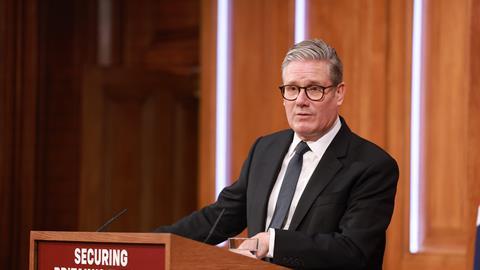Thinktank Policy Exchange is seeking to propel withdrawal from the European Convention on Human Rights – once ‘the headbanger’s view’ – into mainstream political debate
It’s called the Nixon-in-China paradox. The theory is that the leader best placed to slaughter a political sacred cow is the one hitherto presumed to be its strongest defender. Yet even if the paradox stands up (and there are precious few examples), it stretches credibility to imagine the current prime minister and attorney general leading a root-and-branch review of, much less withdrawing from, the European Convention on Human Rights.
Yet that hope – or fear – surfaced at a high-powered event this week to kick off a new human rights workstream at right-of-centre thinktank Policy Exchange. The aim, according to director Lord Godson (former journalist Dean Godson), is to ‘emancipate’ the discussion of human rights from the legal world and place it in mainstream political debate. ‘Even a year ago, I would have said it was completely impossible to have such a discussion on this topic,’ he said – but times have changed.
Former justice minister Lord Faulks (Edward Faulks KC) agreed. Withdrawal from the ECHR, ‘an option that was seen as the headbanger’s view… has clearly entered the mainstream’, he said in a panel debate chaired by former lord chief justice Lord Burnett (Ian Burnett KC). ‘Even in a government led by human rights lawyers, there are signs of panic.’
On a wider stage, Lord Verdirame (international arbitration specialist Guglielmo Verdirame KC, of Twenty Essex chambers) said: ‘There is a unique opportunity for [convention] reform in the political space in Europe.’
The event took place the day after Sir Keir Starmer’s ‘island of strangers’ speech on immigration and the promise, in an immigration white paper, of legislation to ‘address cases where Article 8 right to family life legal arguments are being used to frustrate deportation’. Of course, this does not show that Policy Exchange is pushing at an open door.
'Even a year ago, I would have said it was completely impossible to have such a discussion on this topic'
Lord Godson
The new workstream is led by Professor Richard Ekins KC of Oxford University, to run in parallel with the 10-year-old Judicial Power Project, also headed by Ekins.
He told the event that the UK’s human rights law creates three problems. One is the dynamism of Strasbourg case law, under the ‘living instrument doctrine’. A second is the uncertainty created by case law under the Human Rights Act. The third, Ekins said, is the ‘political irresponsibility’ that human rights law encourages, for example the use of Henry VIII powers to push through ill-considered legislation.
Ekins was countered by public law specialist Marina Wheeler KC of 1 Crown Office Row, who argued that the current system of human rights protection ‘broadly works well’ and that the perceived problems are overstated. ‘Withdrawal is a nuclear option and would not achieve a good outcome,’ she said. While ‘there is a tension with legal certainty, which clearly we have to acknowledge’, existing mechanisms are capable of handling apparently problematic Strasbourg judgments without fuss. The ruling in the landmark climate change case KlimaSeniorinnen v Switzerland is being implemented through dialogue which ‘mitigates the coercive effect’, she said.
Leaving the convention would be a ‘terrible idea’, Wheeler added. Rather, it is time to be constructive: ‘Our national interest requires us to be engaged.’
Another panellist on the remain side was Gazette columnist Joshua Rozenberg, who noted an inconsistency in the immigration white paper’s references to the Human Rights Act’s ‘article 8’. ‘I didn’t know there was an article 8 in the Human Rights Act,’ he observed drily.
Verdirame declared himself against ECHR withdrawal – but in favour of ‘pretty substantive, though careful, reform’. A particular target: Strasbourg’s living instrument doctrine, which dates from the 1970s. ‘If we don’t fix that, it will be difficult for any other changes we make to be sustainable.’
It is a safe bet that reform of the living instrument will be one output of the Policy Exchange workstream, whether it goes for the nuclear option or not. In the meantime, its initial output will be a paper next week on the foundations of the ECHR – including the oft-cited role of Winston Churchill. This will be followed by a study of past attempts at reform and what politicians should learn from them. A third report will look at the potential consequences of reform or departure, to ‘encourage the public conversation’.
Whether the public conversation can rise above the level of ‘Which human right does a thinktank noted for the opacity of its funding seek to get rid of?’, remains to be seen. As Lord Burnett observed, with judicial understatement, at the moment, ‘quite a lot of discussion is not at the highest level of knowledge’.
This article is now closed for comment.





































11 Readers' comments